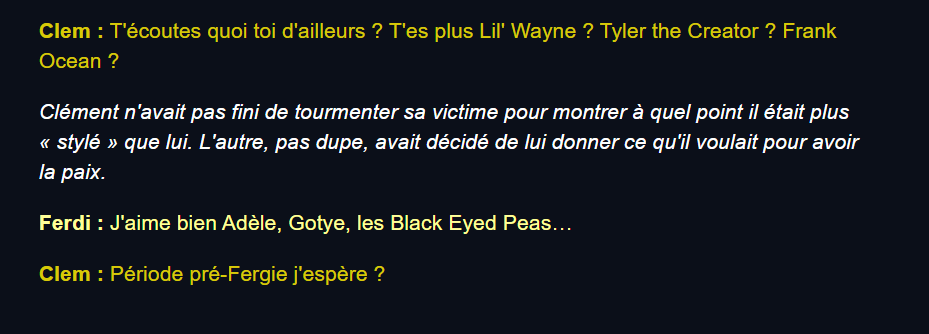Entre Deux
This is a choice-based entry where you play as the recently deceased ghost Victor who visits his friend Guillaume.
It’s the day of Victor’s funeral, and all his friends come over. You, as Victor, can only be seen by Guillaume, but can influence others. Your goal: to help your Guillaume win the heart of long-time friend Marie.
In the meantime, you discover a lot about your friends: one has come out recently, one has a new boyfriend from Senegal, some siblings are squabbling, one person gets a little too drunk, etc.
It’s a little bit like Delightful Wallpaper (the second half), where you influence others subtly, and a bit like Blue Chairs, with its substance-using, young-people-talking parties.
It’s a very long game, maybe too long, but the story it paints is beautiful. It does require (like another reviewer said) a lot of clicking, so I got in the habit of just clicking really fast until it stopped and going back to read over the text.
I really liked this world. It reminded me of the work of Katherine Morayati, of being in ‘the scene’. This had more ‘youth slang’ than any of the other games; I learned a lot. It also has tons of cultural references; my search history has a lot of stuff like Science Po, Francoise Hollande, Knife Party, etc. now.
I like this culture because I was never a part of it. I’ve never drank, never tried marijuana. I had a lot of siblings and cousins and never hung out with other kids after school, so the idea of a big friend group you spend all your time with is something I saw my siblings do but never tried as a kid. As an adult, now I have a lot of nice friends, but there’s not that same element of risk and danger that impressionable young people have when it comes to things like drugs or alcohol or unsafe sex.
Anyway, the story I found was well-crafted and overall it resonated with me. Interactivity felt great; out of all games in this comp, I felt like both choices were okay each time, that both would produce a meaningful story and that I could choose what I really wanted.
Edit: Somehow I found this part relatable and funny:
